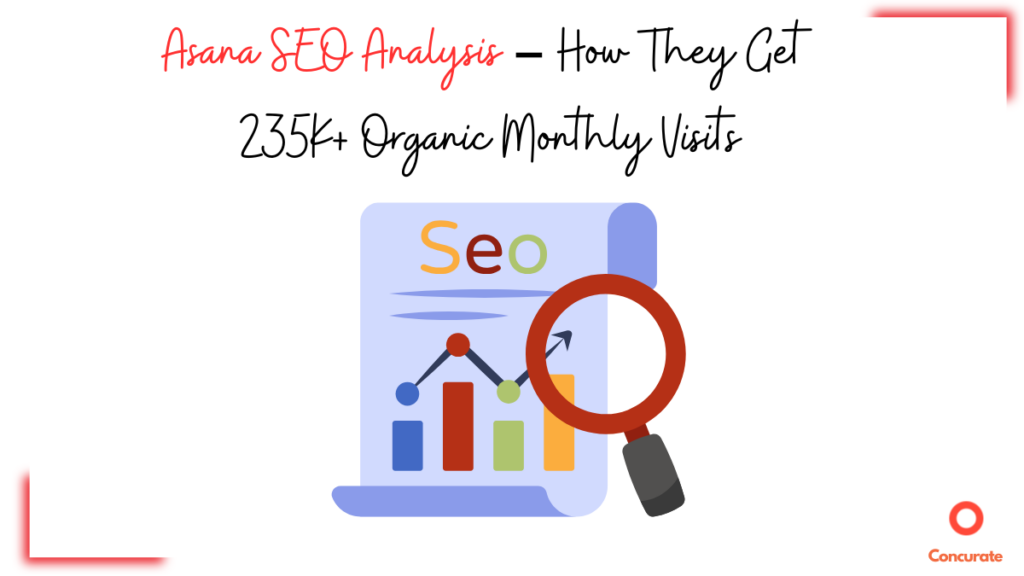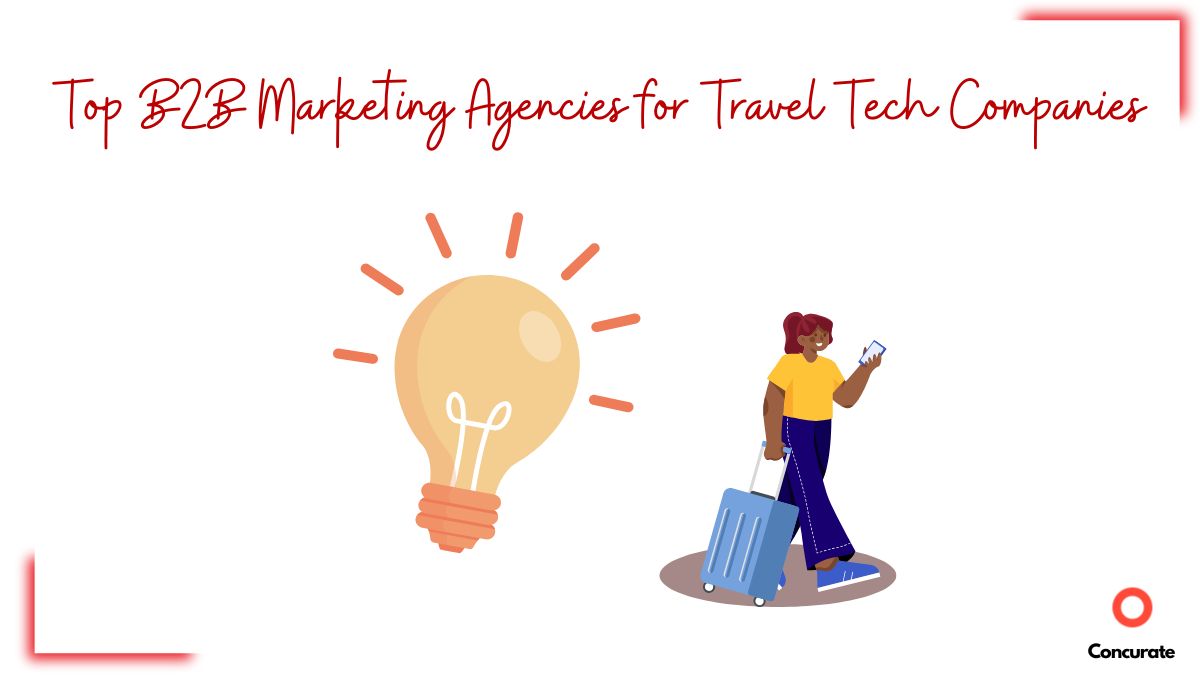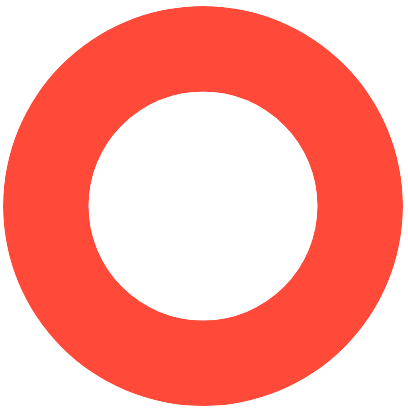You don’t need 100 feature pages to win in SEO.
You need to learn from Asana‘s strategy which brings them 237K organic monthly visits.
They’re winning because they understand how their ICP works, types, and thinks; and they’ve built a content engine to intercept all three by ranking for industry relevant terms like:
● “Agile methodology.”
● “Executive summary example.”
● “RACI chart.”
Asana ranks for all of them; and doesn’t just inform, it funnels that intent into use cases, templates, and product-led pathways.
The result?
Traffic that doesn’t just read. It builds workflows.
If you’re a SaaS founder or CMO wondering why your content isn’t converting; or how to turn mid-funnel chaos into product-qualified leads; you should learn about the real keywords that fuel their growth.
Asana’s SEO Snapshot
| Organic Traffic (Monthly) | 237K |
| Domain Rating (DR) | 90 |
| Backlinks | 5.6M |
Asana Ranks for Every Search Intent
#1 Branded searches: 102.9K visits (Users already familiar with the brand)
#2 Non-branded searches: 133.8K visits (Capturing users before they know the brand)
#3 Informational searches: 219.8K visits (Users seeking knowledge and insights)
#4 Navigational searches: 97.4K visits (Users looking for a specific website or page)
#5 Commercial searches: 89.1K visits (Users researching before making a purchase)
Top Pages Driving Traffic
| Page | Keyword | Position | Monthly Traffic |
| asana.com/pt | asana | 1 | 80,138 |
| asana.com/pt/resources/swot-analysis | analise swot, swot | 1 | 19,641 |
| asana.com/pt/resources/team-building-games | brincadeiras para fazer com amigos | 1 | 13,451 |
| app.asana.com/-/login | asana login | 1 | 10,152 |
| asana.com/ | asana, asan | 2 | 6,113 |
| asana.com/pt/resources/eisenhower-matrix | matriz de eisenhower | 1 | 5,020 |
| asana.com/pt/resources/pareto-principle-80-20-rule | regra de pareto | 1 | 4,983 |
| asana.com/pt/download | asana | 1 | 3,592 |
| asana.com/pt/resources/team-motivational-quotes | frases motivacionais trabalho | 3 | 3,480 |
| asana.com/pt/resources/icebreaker-questions-team-building | perguntas engraçadas, dinamica de perguntas e respostas | 6 | 3,414 |
#1 The SWOT Analysis page is a powerhouse, ranking #1 for “analise swot” and “swot,” making it a go-to resource for professionals looking for strategic insights.
#2 The login page is a high-traffic gateway, ensuring returning users access their workspace without hassle.
#3 Team-building content is a sleeper hit, with pages like “brincadeiras para fazer com amigos” pulling in thousands of searches from people seeking engaging group activities.
Asana Wins with Smart Content & Search Demand
#1 Informational content dominates, with resources like the Eisenhower Matrix and Pareto Principle pages securing top positions, making Asana a learning hub for productivity seekers.
#2 Branded keywords keep the momentum strong, multiple pages rank for “asana,” reinforcing the brand’s presence across different intent levels, from downloads to pricing.
#3 High-intent, practical resources, such as the “what is a flowchart” page, capture users actively searching for structured problem-solving tools, positioning Asana as a go-to productivity guide.
Asana’s focus on mapping the buyer’s journey and filling content gaps mirrors how creately strategically captures search intent to guide users through its platform.
Global Traffic Domination
Top Traffic Sources
#1 United States – 1.1M visits/month (19.0% of total traffic)
#2 Mexico – 676.1K visits/month (11.6%)
#3 India – 274.2K visits/month (4.7%)
#4 Brazil – 236.6K visits/month (4.1%)
#5 Colombia – 232.4K visits/month (4.0%)
While the U.S. remains the dominant source, Mexico is making massive strides, growing faster than any other region.
India, Brazil, and Colombia also show steady growth, proving that Asana’s global expansion strategy is paying off.
Asana’s Backlink Profile
| Metric | Value |
| Total backlinks | 5.6M |
| Referring Domains | 69.1K |
| High-Authority Links | Links from Google, Apple, Wikipedia, Microsoft, Amazon |
#1 When giants like Google, Apple, and Microsoft link to you, it’s a clear sign you’re doing something right. Asana isn’t just ranking; it’s earning trust from the biggest names in tech.
#2 With 5.6 million backlinks from 69.1K domains, Asana isn’t just chasing links; it’s strategically securing them. High-authority mentions combined with a massive referring domain pool keep its SEO dominance rock solid.
Traffic Breakdown
| Source | Value |
| Organic Search | 237K |
| Paid Search | 258 |
Asana’s Technical Health
Core Web Vitals (Desktop):
Largest Contentful Paint (LCP): 1.9s (Poor)
Cumulative Layout Shift (CLS): 0.23 (Poor)
Interaction to Next Paint (INP): 412ms (Very Poor)
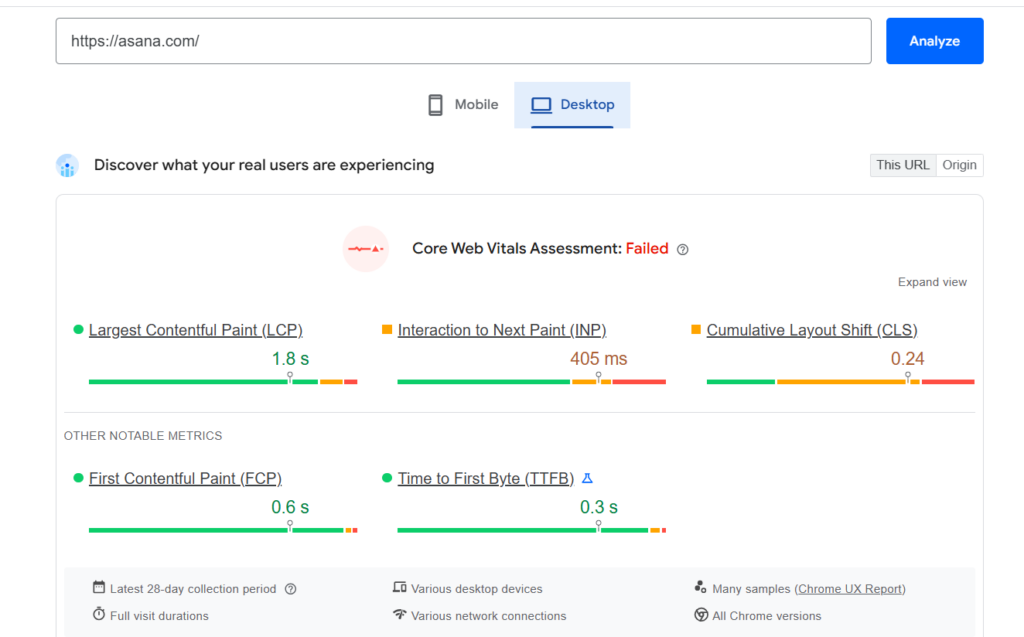
Source:PageSpeed Insights
Mobile Friendliness: Moderate
#1 With an LCP of 1.9s, Asana’s load times aren’t up to Google’s standards. Slow-loading pages can frustrate users and hurt rankings, something they’ll need to fix to stay competitive.
#2 CLS of 0.23 means elements are shifting unpredictably, while an INP of 412ms signals sluggish interactions. These aren’t just minor issues, they directly impact engagement and conversions.
Things to Learn from Asana’s High-Intent SEO & Things to Convert Competitor Traffic into Product Signups
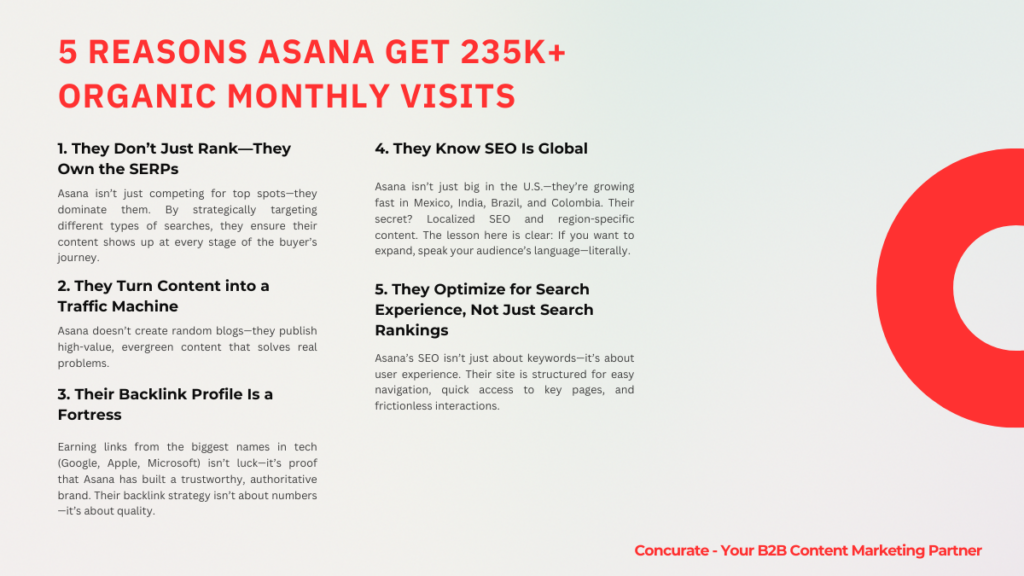
#1 Dominate High-Intent, High-Volume Keywords; Then Convert with Templates and Frameworks
Asana ranks #1 for “agile methodology” (34K volume) and “executive summary example” (19K volume); pulling over 34,000+ monthly visitors from just these two keywords.
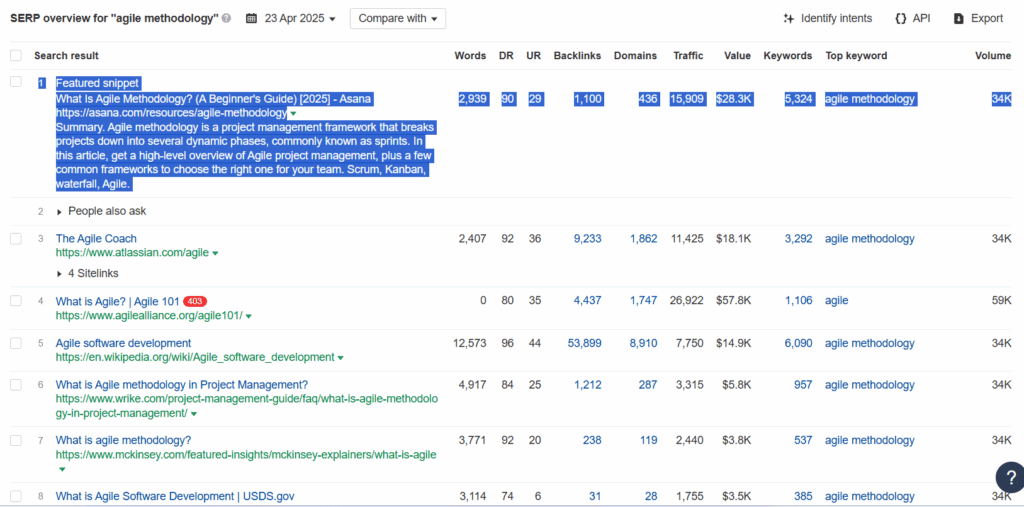
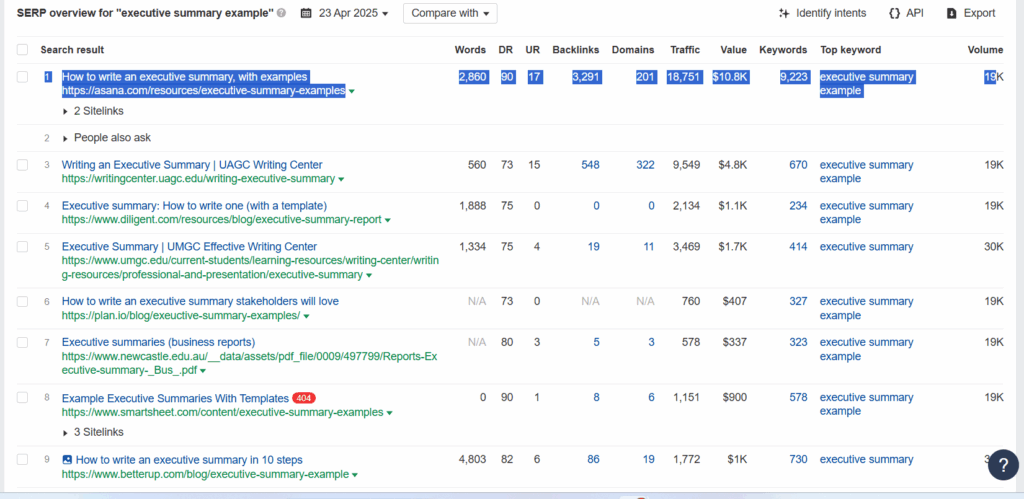
What Asana Did Right:
- Tapped into evergreen, problem-solving search terms with consistent, annual demand
- Delivered template-style content that’s immediately usable (not just readable)
- Combined topic authority with UI polish and internal linking to drive deeper engagement
SaaS Playbook: Things to Learn:
- Identify “template + explanation” keywords your ICP actively Googles
- Build tool-adjacent content that educates and nudges toward your product (like frameworks or checklists)
- Refresh annually (add [2025], [latest], etc.) to maintain freshness and reclaim top spots
Takeaway:
Don’t write content about your product; write content that solves your ICP’s workweek. Then softly bridge that solution to your tool. Think: templates, guides, frameworks, and starter packs that show real utility.
#2 Build Evergreen Traffic Machines Around Strategic Decision-Making Keywords
Asana pulls in 36,000+ monthly visits by ranking for high-volume, intent-rich keywords like “SWOT analysis examples” (13K) and “Eisenhower Matrix” (46K). These aren’t product features; they’re decision-making tools their ICPs use daily.
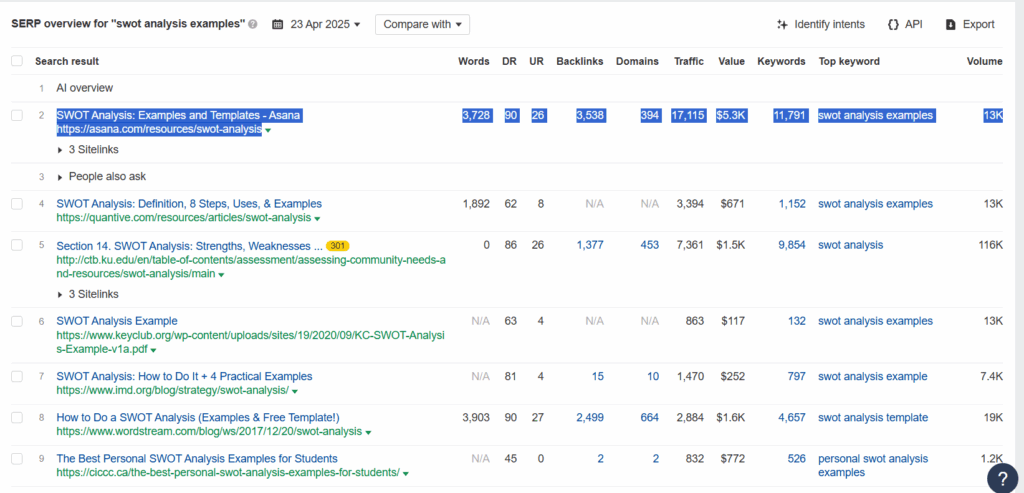
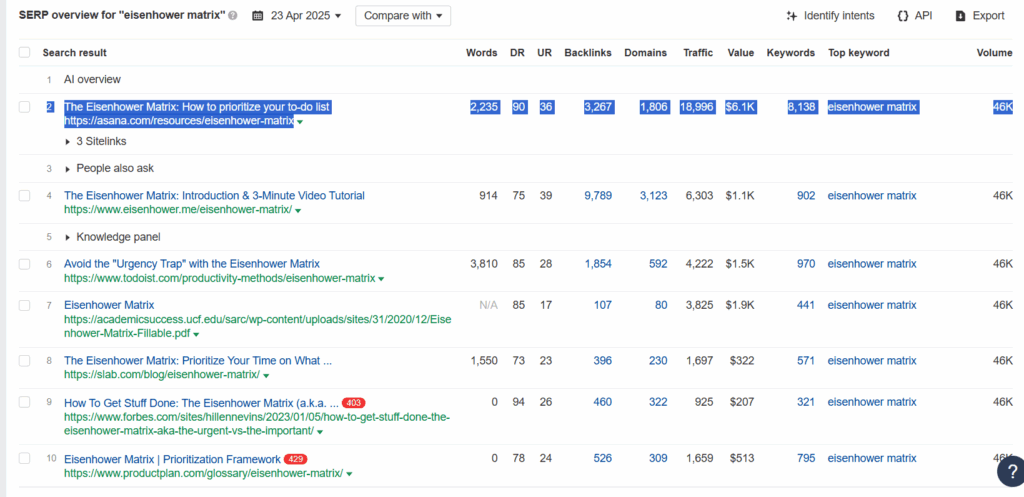
What Asana Did Right:
- Mapped content to real executive workflows; not just buyer personas
- Used frameworks like SWOT & Eisenhower Matrix to earn topical trust + backlinks
- Embedded subtle product context without hard-selling; as seen on /resources/
SaaS Playbook: Things to Learn:
- Pinpoint frameworks your ICPs already use (think: RICE scoring, OKRs, etc.)
- Rank for [examples] and [templates] variants; they signal action-ready intent
- Build content pages that teach first, then guide to product relevance
Example from SaaS:
ClickUp ranks for “project timeline template,” “workload management,” and “Gantt chart examples”; each page teaching before pitching, layered with in-product CTAs. Learn from their content strategy.
Takeaway:
The fastest way to win trust (and traffic) isn’t by talking about your product; it’s by owning the mental models your buyers already use. Be the best teacher in the room.
#3 Own the “Ops” Layer of Your ICP’s Workflow
Asana earns 36,000+ monthly visits from high-utility, operational queries like “competitive analysis example” (13K) and “team building games” (9.1K). These aren’t SEO vanity plays; they’re ops painkillers searched by managers, leads, and strategic buyers.
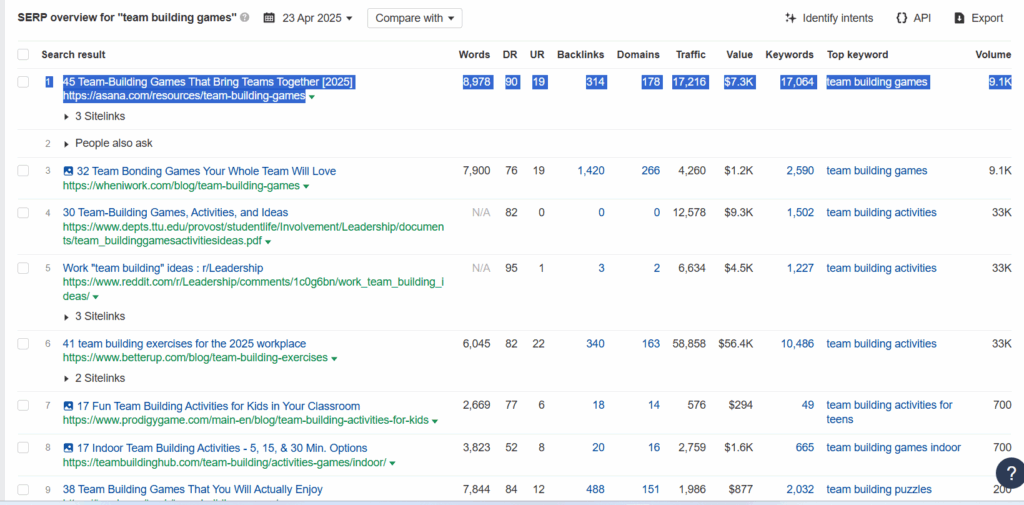
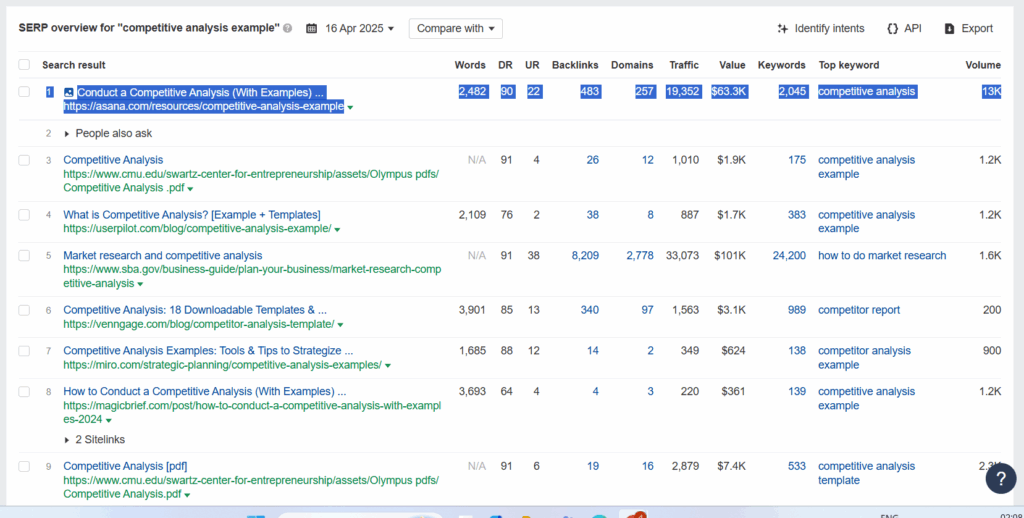
What Asana Did Right:
- Created operational utility pages that slot into weekly tasks (team building, competitor research)
- Targeted bottom-funnel + horizontal use cases; beyond traditional project management
- Paired content with templates and real-world examples, not fluff
SaaS Playbook: How to Apply This:
- Identify non-core but high-friction workflows your ICP faces weekly (e.g., onboarding, reporting)
- Build “example” or “template” content hubs; these have massive SEO leverage
- Don’t just write; solve. Provide downloadable tools or plug-and-play formats
Takeaway:
SaaS SEO doesn’t just live in product features or categories; it thrives in the ops layers where pain is real, budgets exist, and trust is built. Rank where the work actually happens.
Ready to Stop Writing Content That Flatlines?
Most SaaS companies aren’t failing at SEO because they lack effort. They’re failing because they’re producing content that sounds good in meetings but doesn’t solve problems in the wild.
At Concurate, we help SaaS teams like yours to build a content engine that ranks, resonates, and converts.
Here’s what we do differently:
● We don’t chase keywords; we reverse-engineer the work your ICP does every week
● We don’t write articles; we build SEO assets mapped to real business motions
● We don’t promise traffic; we design for revenue-impacting sessions (because ranking is just the first step)
So if your blog is stuffed with “What is X?” posts that no buyer reads; or worse, if your best content isn’t tied to what your ICP actually Googles; let’s fix that.
Get a free teardown of your current SEO strategy. We’ll show you 3 specific opportunities to:
- Own operational keywords in your category (like “competitive analysis example”)
- Capture high-intent traffic without hard-selling
- Build assets that double as lead magnets and onboarding flows
Disclaimer:
This article is an independent analysis based on publicly available data regarding Asana’s SEO strategy. It is not endorsed by, affiliated with, or sponsored by Asana Inc. All trademarks mentioned are the property of their respective owners.


